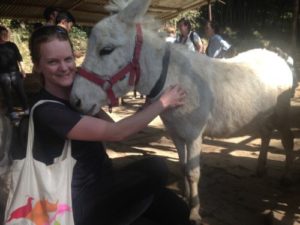Every vet, vet nurse, animal physio, farrier, behaviourist, welfare officer or animal nutritionist knows there is one major welfare issue that comes up again and again – and that’s obesity. Amazingly, approximately 35% of dogs, cats and horses in the UK are thought to be obese, leading to a vast range of other health issues and reduced life expectancy.
Treating obesity in pets looks simple at first glance– feed them less and exercise them more, surely? However, as animal professionals know, it is way more complicated than that. Obesity usually arises from a complex combination of factors such as our relationship with pets, our relationships with food, our relationships with family, and our in–built habits. Many dieting programmes fail to consider these important psychological and social elements, and hence they may fail.
An understanding of human behaviour change can transform how practitioners interact and communicate with their clients, taking factors that have previously been barriers to change, such as our habits, and using them to help change happen.
This short, pragmatic distance learning course is for practitioners working at the front line in companion animal and equine obesity (including vets, vet nurses, nutritionists, physiotherapists, behaviourists, welfare officers, trainers, farriers/trimmers and more). The course will enable participants to explore human behaviour change approaches to managing obesity primarily in dogs, cats, and horses. Participants will learn the need to first understand the drivers of the issue and the barriers involved in change, then explore potential ways to design change interventions to facilitate change and how to monitor activities to ensure they are impactful. Participants will learn about facilitating change at individual, local and national levels, and will compare contrast different aspects in relation to management of the different species.
This interactive course will take approximately five to seven hours to complete and consist of recorded talks and worksheets for the participants’ self-study and reflection as well as links and further reading. Support will be available throughout, and included in the price is the opportunity to attend a live Q&A session with the HBCA team.
Sections include:
- Background – overview of human behaviour change and why it is important
- Psychology of companion animal ownership and obesity.
- Understanding obesogenic environments
- Thinking about how participants can make changes at the level of the individual, community, and society.
- A perspective from human health
- Summary and next steps
The feedback from this course will be used in the planning of a more in-depth package that will bring together a wider range of stakeholders, including academic and commercial organisations.
Practitioners who take part in this initial course and successfully implement human behaviour change approaches in their clients, will be encouraged to work together to share their experiences with future participants in the in-depth course. There is the possibility that recommendations could be put together from the group to create a useful resources and events both online and in person.


Tamzin Furtado
Tamzin is a social scientist with a background in global health, and has a specific interest in the interconnections between human and animal health and wellbeing. She completed a PhD at the University of Liverpool studying how we can improve… Read more »
Available now on our Thinkific site
6 hours of learning
£70 – you can pay online through the Thinkific platform using Stripe or PayPal.
The Course Facilitators are the HBCA’s Tamzin Furtado, Suzanne Rogers and Jo White

